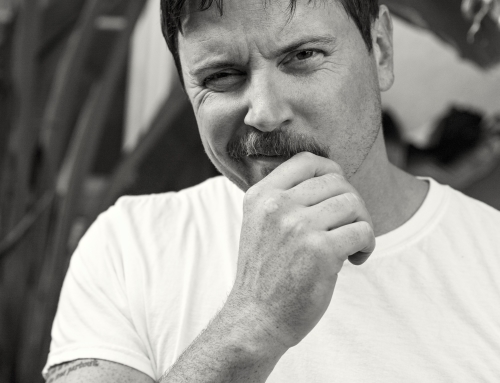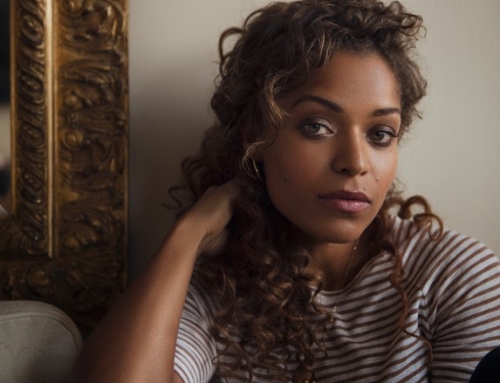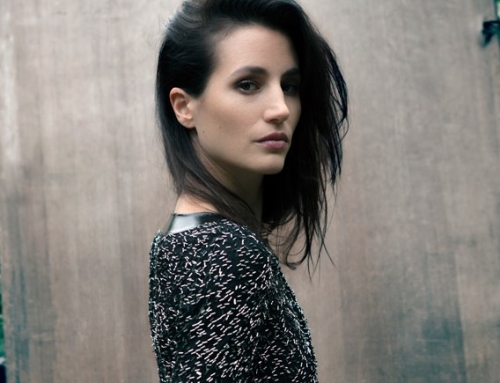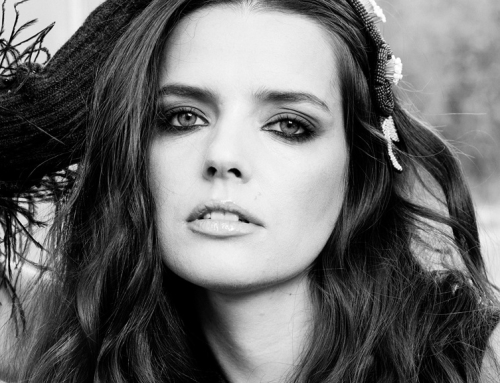The line between truth and myth is one often blurred by the whims of the perceiver. Histories great love stories are proof of this phenomenon; inherently mysterious as a narrative known in full only by the lovers themselves, there is perhaps no single story with so debated a “truth” as the passion tale shared between King Edward VIII and Mrs. Wallis Simpson.
“We’re all looking for happily-ever-after-stories, but this one is on such a grand scale,” says actor James D’Arcy of the gripping nature of this historic romance. Cast as the charismatic Edward in W.E. — the latest filmic interpretation of the epic love that saw a British King renounce his thrown to marry a divorced American socialite — D’Arcy is aware of the weight this nationally-prized love story carries in regards to the public’s concern with a truthful recounting of its history and its contentious opinion of the story’s hero and his controversial heroine, who — as W.E. postulates — in winning the King’s heart risked becoming “the most despised woman in the world.” But, as D’Arcy suggests, towing the line between fact and fiction is precisely the point when dramatizing such emotionally evocative and debated historical subject matter. “The thing that I fast discovered about Edward and Wallis is that there are so many versions of the ‘truth’ of their story,” he says.
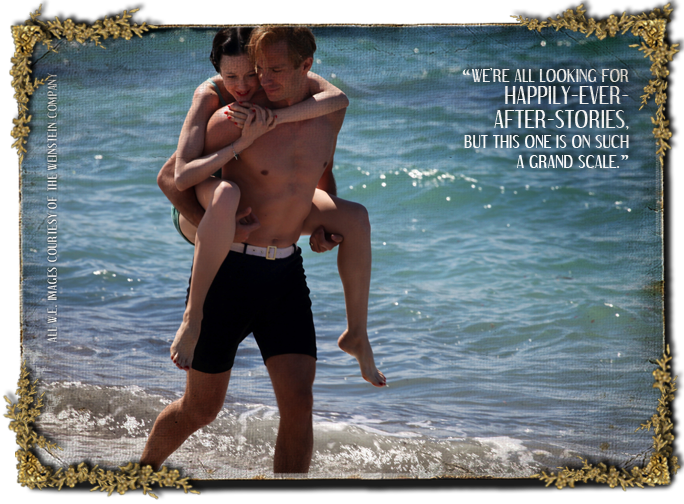
At its core W.E. is a creative vision and an exercise in narrative vigor, it is not a historic record; the film is but another churn in the mix of pronounced truths and threaded myths that have surfaced since the relationship between Edward and Wallis turned from constitutional crisis in 1936 to today’s historic drama — beloved by some, bemoaned by others and immortalized by the collective memory of the British nation.
Premiered in North America at the Toronto International Film Festival, the film has been a buzz maker across the globe since news of its production surfaced, owing in large part to the women behind the camera: Madonna. Directed and co-written by reigning pop culture queen, W.E. unfurls the courtship between the King and his American love interest through the rose-coloured glasses of Wally Winthrop (Abbie Cornish), a modern day New Yorker who becomes obsessed with trying to escape her unhappy reality by immersing her thoughts in the happily-ever-after of Edward and Wallis (Andrea Riseborough), the mythical Duke and Duchess of Windsor.
Currently in theatres across North America, FILLER talked to W.E. star James D’Arcy — now in production for Cloud Atlas, to be release later this year — about the importance of dramatic license when making a historic fiction, being directed by mega superstar Madonna and the irresistible romance of Edward and Wallis.

What was your first thought when cast as Edward?
I guess it was of relief really. It had been going on for a couple of weeks, which is actually pretty fast, but all the time I had been hearing really promising things like “she really likes you” and “I think you’re going to get it,” which is usually the kiss of death, that usually means you’re not going to get it actually. So when I found out that it had worked out the way people suggested it might, it was just a relief really. I thought, “Oh my god, this is great, I don’t have to look for a job for a bit.” (laughing)
With films like this, historic accuracy is always something that is scrutinized. In W.E.’s case was it less about communicating a concrete history and more just about telling a beloved and debated story in a fresh and interesting way?
I think that’s exactly right. It’s told very much from the director’s perspective — she wrote the script, she directed the film.
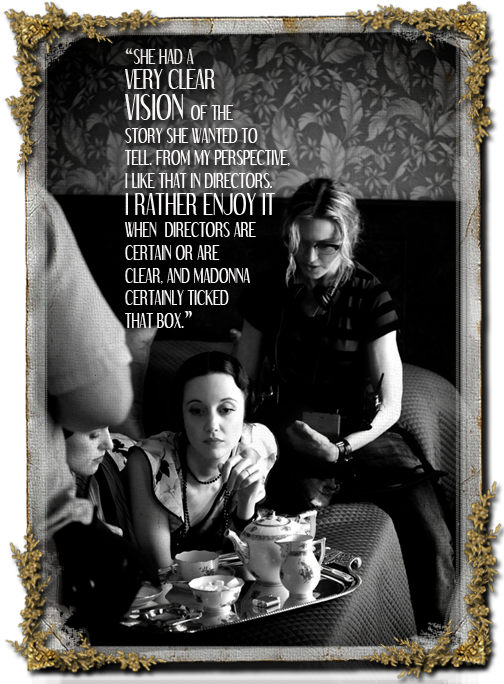
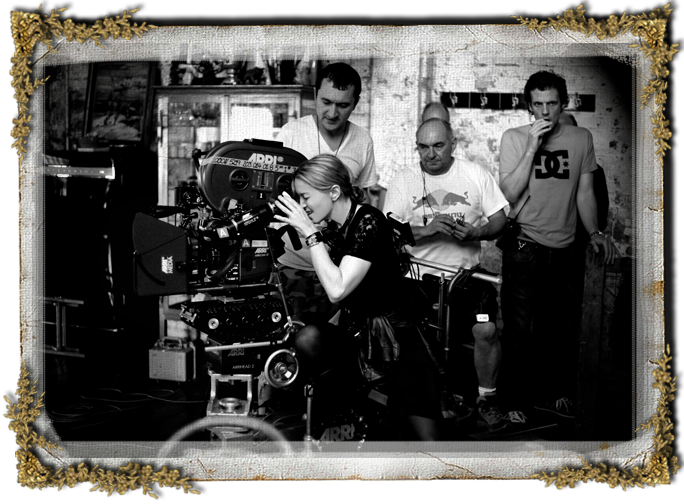
Sounds like quite a personal project for her.
You know there was a part of me that thought, is she really going to direct it or are other people going to direct it and she’s going to sit in a chair and say “action” and “cut?” But she’s the hardest working person I ever met in my entire life. The film is entirely her work.
Right down to the original story as you mentioned before — it’s her interpretation of events, not a story based on objective historic fact alone, no?
The thing that I fast discovered about Edward and Wallis is that there are so many versions of the “truth” of their story. That really, whatever you believe to be true, I could find evidence that could support that. But the thing is, a lot of it is contradictory, in terms of historic accuracy that makes it quite difficult because what exactly is “accurate.”
What does that mean to you as an actor?
From an actor’s perspective: I’m not a historian, I’m not a writer of this film, my job is solely to serve the script and serve the director’s vision, which were very very clear, so you know honestly, I didn’t spend too much time worrying about what would be considered historically accurate because it potentially could all be accurate.
The existence of a great passion between Edward and Wallis’s story is at least one fact that is hard to contradict. What about their romance do you think has so long gripped the public?
I think we are all encouraged by the movies, and by songs, by books and poems that you know love is the thing, and of course anyone who’s been in love knows that that’s true. And, we’re all looking for happily-ever-after stories, and this is one of those stories, but this one is on such a grand scale that it makes us think, “well wait a minute, if I was the King of England — I mean I would be the King! Would I really give it all up because I was so in love with someone else?” And then there is the whole other perspective of it, which is that this man has been raised his entire life to do his duty for the country and he didn’t do it. So there are two opposing views of what exactly it was that he did. Of course this film very much tells the story from Wallis’s perspective and what she gave up. I think that those kinds of questions utterly fascinate people. At the root of it all, [the story] talks about an emotion we can all relate to pretty closely.
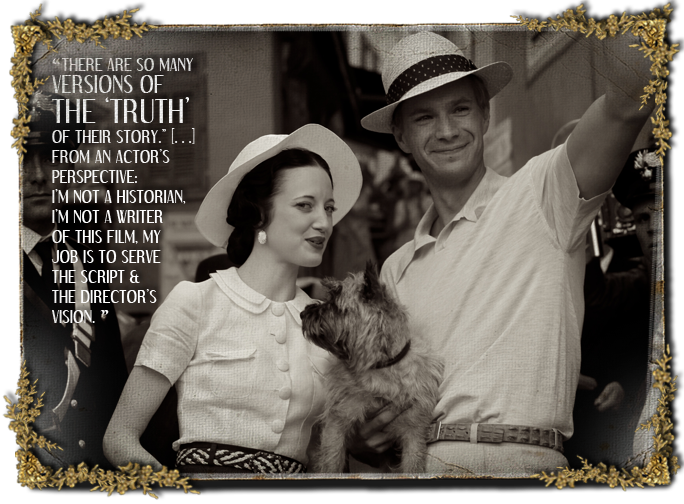
What’s your personal opinion of his decision to step down?
Ohhhhh….the truth is, I don’t know if I really formed an opinion because when you’re playing somebody — when you’re playing a real life person — your job is not to judge them, the minute you would judge them, you have stepped outside who you think they are. So, honestly, my opinion is neither here nor there and isn’t fully formed anyway.
In your research for the role, did you begin falling for the fairy tale element of the story a bit yourself?
I thought it was pretty romantic. And of course, don’t we all look for that kind of wholeness.
Let’s talk a bit about working with Madonna, she seems like the decisive type, was she a pretty steady and concentrated hands-on director or more one for improvising?
She was pretty clear as to how she wanted it to be. The truth is, we’re all human beings and it could never be an exact replica of what she had in her head and she appreciated that. We of course bring things to it that we naturally bring — that’s a part of who we are as actors— but she had a very clear vision of the story she wanted to tell. From my perspective, I like that in directors, I find it harder when directors are less clear about what they are looking for, I rather enjoy it when directors are certain or are clear, and Madonna certainly ticked that box.
She’s quite the cultural icon, was she larger than life on set?
Well, she’s certainly a force to be reckoned with. Her work ethic is unbelievable; she never stops. I don’t think she could have slept when we made the film because she was sending emails at 2 o’clock in the morning and then there would be another email at 5 o’clock in the morning. So maybe she had like two and a half hours when she slept or something, but she worked crazy hours. And yeah, of course she’s the most famous woman in the world, so there is no chance she’d be on set and no one would know about it, she didn’t sneak around. Yeah, she’s a strong woman.
Having Madonna attached to a project is an attention grabber in more ways than one. W.E. has been getting mixed reviews, a lot of criticism seeming to be more about Madonna as a director rather than the quality of the film itself. It seems in some regard, the critics’ and the audience’s opinion of W.E. may in fact be more their opinion of Madonna rather than that of the film. What do you make of this?
I think that Madonna has been about as famous as it’s humanly possible to be, for what…about 30 years? And, she has courted controversy for most, if not all, of that time, so the idea that she would then be involved in a project that was kind of run of the mill and didn’t arouse emotion in people…ah…strikes me as being kind of bizarre.
That’s a good point. Makes sense then to choose such a debated historic story.
She has said, that the reason she wanted to make a film about Edward and Wallis was because she noticed if you mentioned their names when you were with people, it was a bit like dropping a Molotov cocktail into the conversation because everybody has really strong views, and that was one of the things that must have attracted her to the idea of telling their story. I think people have very strongly held views of Madonna, both positively and negatively and have done for a long time and therefore, yeah, creatively — [with] pretty much everything that she does — some people are going to have a judgment of it without having seen or heard it, but that just goes with the territory.
Do you pay much attention to reviews and criticism?
No I don’t read it.
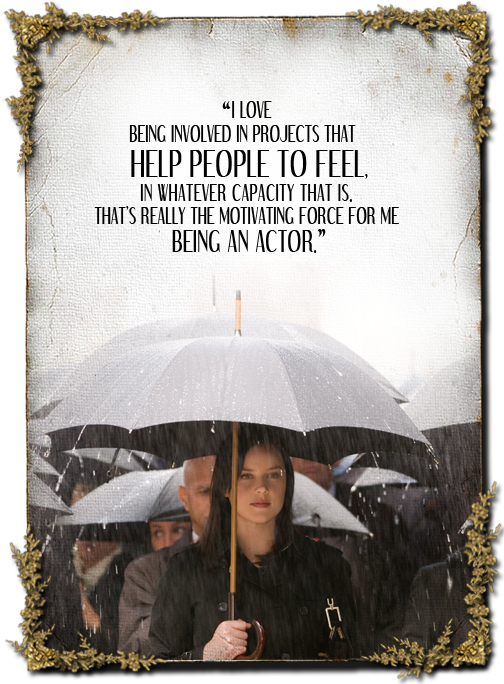
Your career is pretty widely split between film and television and American and British productions, what’s the connecting thread between projects?
When I was a kid, going to the movies was the place where I felt very comfortable and very safe to have emotions…very excitable emotions…I remember watching the Star Wars films and being like someone had filmed my imagination — it was extraordinary. I lived in that universe in my head for years. And there were other films I would watch and they’d make you happy or sad, and I felt very safe to have those emotions in the cinema…in that darkened room. And I just I love it so much, I want to contribute to that world and be a part of that. I don’t know if there is a clear thread that runs through the projects that I have done, but I love being involved in projects that help people to feel, in whatever capacity that is. That’s really the motivating force for me being an actor; I love the idea that I might be contributing in someway to some 8-year -old who is like me…not that I’m imaging some 8-year-old is going to watch W.E., but you know I can be part of an artistic endeavor that hopefully people will talk about, will feel, hopefully their lives may be enriched.








